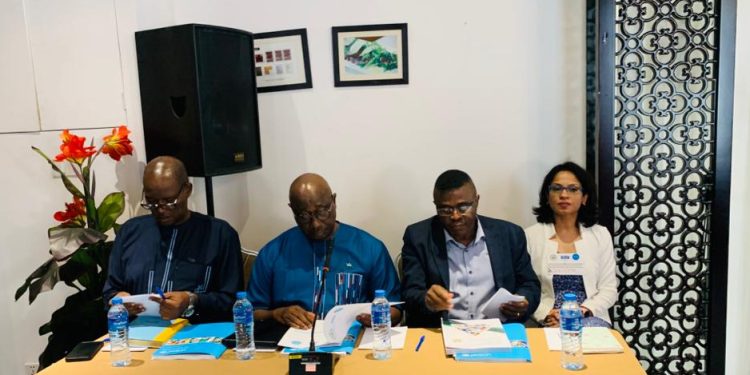By Alfred Kabia
Atlantic Hotel, Freetown | July 2025 — The Deputy Minister of Planning and Economic Development, Rev. Dr. Jonathan Titus-Williams, officially opened a five-day Technical Design Workshop on the development of Sierra Leone’s Medium-Term National Development Plan (MTNDP) 2024–2030 Digital Tracking Dashboard at the Atlantic Hotel in Freetown.The workshop, held from 22 to 26 July 2025, brings together technical experts from across Ministries, Departments, and Agencies (MDAs), development partners, and international consultants to co-design a digital, interactive, and real-time monitoring tool. This system—referred to as a Decision Support System—is aimed at improving evidence-based accountability and informed decision-making.
In his keynote address, Deputy Minister Titus-Williams described the MTNDP 2024–2030 as “not just a document, but a roadmap” for Sierra Leone’s transformation—anchored in food security, human capital development, job creation, resilient infrastructure, and good governance. He emphasized the need for a real-time control mechanism to track implementation and guide strategic interventions.
“This dashboard is more than software; it is an investment in our national governance, accountability to citizens, and capacity to deliver on the MTNDP,” he stated. “Its design is a strategic necessity, not just a technical task. This will become Sierra Leone’s development control room.”
The workshop builds on a prior technical meeting held on 19 June 2025, where officials from MoPED and UNICEF met with the consultant leading the design process. The Ministry’s M&E Directorate provided key indicators aligned with the MTNDP, laying the foundation for this collaborative session. The goal is to ensure the system reflects the unique priorities and structures of Sierra Leone’s development agenda.
Deputy Development Secretary Usman Cherry Conteh, in his welcome remarks, highlighted the importance of strong partnerships:
“Thanks to UNICEF’s continued support, we are turning the MTNDP from a plan on paper into a living, actionable framework. This dashboard will ensure reliable, timely, and usable data is available to drive effective policy.”
Conteh described the dashboard in relatable terms—like traffic lights guiding movement—emphasizing its function in providing real-time insights into project performance across sectors.
Speaking on behalf of UNICEF, Dr. Robert Ndamobissi commended Sierra Leone’s results-oriented approach and reaffirmed UNICEF’s commitment to strengthening data systems. He emphasized that data is power, and accountability must be embedded at all levels of governance:
“Citizens are demanding transparency. This dashboard is a critical mechanism to deliver on that expectation. It gives government actors and citizens the tools to assess performance and guide development.”
Dr. Ndamobissi referenced the Global Partnership for Effective Development Cooperation, reaffirming the need for accurate, timely data and mutual accountability—both of which this dashboard aims to support.
In her introductory presentation, Dr. Jeeveeta Soobarah Agnihotri, international consultant from the Community Systems Foundation, described the workshop as a co-creation and learning journey. While widely referred to as a “dashboard,” she positioned the platform as a Decision Support System—a tool to transform data into action.
“This is not just about monitoring. It’s about informing policy, guiding investments, and holding ourselves accountable. I come with technical experience, but you—experts from Sierra Leone—are the architects of this plan.”
Drawing from her personal story, Dr. Jeeveeta used the analogy of tailoring—precision, patience, and collaboration—as a metaphor for how the dashboard will be built. She stressed the importance of ownership, participation, and sustainability.
Daniel Banya Braima, Deputy Director of Monitoring and Evaluation at MoPED, provided an overview of the digital transformation journey. He noted that the January 30, 2024, launch of the MTNDP revealed the urgent need for a real-time data system to replace traditional, delayed reporting mechanisms.
“We don’t want to wait for endline evaluations. We want live data to track progress, identify bottlenecks, and respond swiftly,” he said. “This dashboard is how we’ll get there.”
He reaffirmed MoPED’s commitment to collaboration and expressed gratitude to UNICEF and Dr. Jeeveeta for their support.
The workshop aims to produce a prototype of the MTNDP Performance Dashboard with a clear set of indicators, visualizations, and user interfaces tailored for various audiences—from ministers and policymakers to local councils and development partners.
Participants were encouraged to contribute sector-specific indicators, particularly in areas such as education, agriculture, health, and governance. Discussions will continue throughout the week to ensure the platform is not only technically sound, but nationally owned and operationally relevant.
As the opening day concluded, a spirit of purpose, urgency, and collaboration filled the room. With high-level leadership, deep technical engagement, and partner support, the workshop marks a major step in advancing a data-driven development culture in Sierra Leone.










